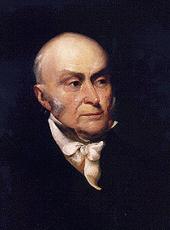ADJUTANT-GENERAL'S OFFICE,
GENERAL ORDERS.
The General in Chief has received from the Department of War the following orders:
The President with deep regret announces to the Army that it has pleased the Disposer of All Human Events, in whose hands are the issues of life, to remove from the scene of earthly existence our illustrious and venerated fellow-citizen, Thomas Jefferson.
This dispensation of Divine Providence, afflicting to us, but the consummation of glory to him, occurred on the 4th of the present month--on the fiftieth anniversary of that Independence the Declaration of which, emanating from his mind, at once proclaimed the birth of a free nation and offered motives of hope and consolation to the whole family of man. Sharing in the grief which every heart must feel for so heavy and afflicting a public loss, and desirous to express his high sense of the vast debt of gratitude which is due to the virtues, talents, and ever-memorable services of the illustrious deceased, the President directs that funeral honors be paid to him at all the military stations, and that the officers of the Army wear crape on the left arm, by way of mourning, for six months.
Major-General Brown will give the necessary orders for carrying into effect the foregoing directions.
J. BARBOUR.
It has become the painful duty of the Secretary of War to announce to the Army the death of another distinguished and venerated citizen. John Adams departed this life on the 4th of this month. Like his compatriot Jefferson, he aided in drawing and ably supporting the Declaration of Independence. With a prophetic eye he looked through the impending difficulties of the Revolution and foretold with what demonstrations of joy the anniversary of the birth of American freedom would be hailed. He was permitted to behold the verification of his prophecy, and died, as did Jefferson, on the day of the jubilee.
A coincidence of circumstances so wonderful gives confidence to the belief that the patriotic efforts of these illustrious men were Heaven directed, and furnishes a new seal to the hope that the prosperity of these States is under the special protection of a kind Providence.
The Secretary of War directs that the same funeral honors be paid by the Army to the memory of the deceased as by the order of the 7th (11th ?) instant were directed to be paid to Thomas Jefferson, and the same token of mourning be worn.
Major-General Brown is charged with the execution of this order.
J. BARBOUR.
Never has it fallen to the lot of any commander to announce to an army such an event as now calls forth the mingled grief and astonishment of this Republic; never since History first wrote the record of time has one day thus mingled every triumphant with every tender emotion, and consecrated a nation's joy by blending it with the most sacred of sorrows. Yes, soldiers, in one day, almost in the same hour, have two of the Founders of the Republic, the Patriarchs of Liberty, closed their services to social man, after beholding them crowned with the richest and most unlimited success. United in their end as they had been in their highest aim, their toils completed, their hopes surpassed, their honors full, and the dearest wish of their bosoms gratified in death, they closed their eyes in patriot ecstasy, amidst the gratulations and thanksgivings of a people on all, on every individual, of whom they had conferred the best of all earthly benefits.
Such men need no trophies; they ask no splendid mausolea. We are their monuments; their mausolea is their country, and her growing prosperity the amaranthine wreath that Time shall place over their dust. Well may the Genius of the Republic mourn. If she turns her eyes in one direction, she beholds the hall where Jefferson wrote the charter of her rights; if in another, she sees the city where Adams kindled the fires of the Revolution. To no period of our history, to no department of our affairs, can she direct her views and not meet the multiplied memorials of her loss and of their glory.
At the grave of such men envy dies, and party animosity blushes while she quenches her fires. If Science and Philosophy lament their enthusiastic votary in the halls of Monticello, Philanthropy and Eloquence weep with no less reason in the retirement of Quincy. And when hereafter the stranger performing his pilgrimage to the land of freedom shall ask for the monument of Jefferson, his inquiring eye may be directed to the dome of that temple of learning, the university of his native State--the last labor of his untiring mind, the latest and the favorite gift of a patriot to his country.
Bereaved yet happy America! Mourning yet highly favored country! Too happy if every son whose loss shall demand thy tears can thus soothe thy sorrow by a legacy of fame.
The Army of the United States, devoted to the service of the country, and honoring all who are alike devoted, whether in the Cabinet or the field, will feel an honorable and a melancholy pride in obeying this order. Let the officers, then, wear the badge of mourning, the poor emblem of a sorrow which words can not express, but which freemen must ever feel while contemplating the graves of the venerated Fathers of the Republic.
Tuesday succeeding the arrival of this order at each military station shall be a day of rest.
The National flag shall wave at half-mast.
At early dawn thirteen guns shall be fired, and at intervals of thirty minutes between the rising and setting sun a single cannon will be discharged, and at the close of the day twenty-four rounds.
By command of Major-General Brown:
R. JONES, Adjutant-General,
John Quincy Adams, Executive Order [on the deaths of Thomas Jefferson and John Adams] Online by Gerhard Peters and John T. Woolley, The American Presidency Project https://www.presidency.ucsb.edu/node/200526

